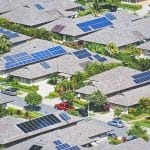The Pros and Cons of Choosing An Off-Grid Solar System
Not all solar systems are the same. When you start researching which type is right for you, you may find yourself deciding between on-grid and off-grid solar power.
This article examines the difference between the two and takes a deeper look at what life is really like when you go off-grid.
What Does Off-Grid Solar Power Mean?
The two main types of residential solar systems are on-grid and off-grid. An on-grid solar system is connected to the city’s electrical grid. In this case, excess solar energy is sold to the city, and the home can use normal electrical power in times of depleted solar energy
As the name suggests, off-grid systems are not hooked up to an electrical grid. The solar systems collect energy in battery storage, which is then used to power the home when the sun isn’t shining.
Pros Of Going Off The Grid
The biggest benefit of going off-grid is that you no longer have to pay energy bills. Houses that choose to stay on-grid dip into electrical energy sources at different times. For example, houses may need on-grid power during the winter months or if the solar system isn’t providing enough power for the house. With off-grid systems, that’s not the case. You’ll never be surprised by high energy bills again.
A second major reason to go off-grid is that your house will no longer be affected by city-wide power outages. Did you know that on-grid solar systems don’t work during outages either? Whether a power line was downed in a storm or damaged during construction work, your neighbors may be in the dark. However, your solar system is self-contained and will not be affected.
Cons of Going Off-Grid
As with everything in life, there are some downsides to choosing an off-grid solar system as well.
The first is the cost. Battery banks and extra equipment are required to store your solar energy when you go off-grid, and they’re more expensive than connecting your solar panels to the city’s electric grid. The average cost of a 13 kW solar system connected to the grid is $23,000, while an off-grid system of the same size can come in at $45,000 or higher.
Additionally, you’ll also lose another financial advantage that on-grid solar systems enjoy: the ability to sell excess energy back to the city. The tariff for exported energy isn’t high, but the payments can definitely add up over the years.
A final con to choosing an off-grid solar system instead of staying on-grid is that your home will require a generator for emergencies. When an on-grid system runs out of solar power, it simply pulls from the electrical system. When you’re off the grid, you’ll be required to use a generator which can be loud, expensive, and a nuisance to store in your home.
Is Going Off-Grid Right For You?
As solar battery prices go down, going off-grid is becoming a more affordable and viable option for American families.
Are you considering going a switch to solar power? If so, you need to take an honest look at both the pros and the cons to determine whether the lifestyle is right for you!





